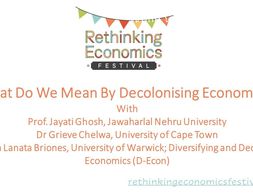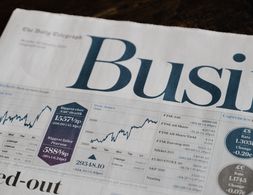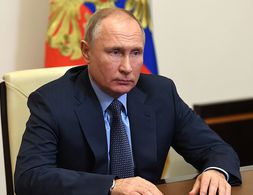✕
380 results
Mainstream economic narratives notably the concept of comparative advantage trade theory which assumes the equal balance of power between parties are deployed to support the merits of Global Value Chains that the global integration via trade creates mutual gains for both developed and developing countries This narrative is advanced in …
In this webinar, Dr. Grieve Chelwa, Dr. Cecilia Lanata Briones and Professor Jayati Ghosh discuss what is meant by “Decolonising Economics”.
Yao Graham, coordinator of Third World Network- Africa, reflects on lessons learned from past Economic Partnership Agreements (EPAs), specifically as they relate to the Post-Cotonou Agreement.
The world has seen the emergence of a rather different system of international lender of last resort organized as a network of central bank liquidity swap lines largely limited to the core countries of the Global North In this system central banks swap their own currency for dollars which they …
After completing the module, participants should have gained a basic understanding of the economic school of thought referred to as "Modern Monetary Theory" and should be able to analyze the monetary processes at play in the economy and evaluate fiscal and monetary policy decisions from an MMT-perspective.
Aim of this intensive workshop is to understand macroeconomic workings of climate change as as the background of sustainable finance; to analyse financial assets with ESG (Environmental, Social and Governance) criteria attached to them and their markets and important institutional players; to develop a critical perspective on the current setup of sustainable finance; and to synthesise this knowledge by applying it on in-depth case studies.
This workshop offers an introduction to Degrowth and Ecological Economics. It starts by surveying the socio-ecological crisis and its pseudo-solutions, and then moves to Ecological Macroeconomics as a relatively recent field of scholarship within Ecological Economics.
After completing the module, participants should be able to understand the economic consequences of gender inequality. They should be able to explain the contradictions between capital and care, analyze the labor market with a gender perspective and develop the ability to describe phenomena such as public policies taking into account "gender" as a category of analysis.
After completing the module, participants should have knowledge and understanding about the theory of Critical Political Economy and its basic methods. They should be able to apply central concepts to analyse critical questions regarding the embeddedness of economic relations within broader social, political and ecological relations.
After completing the module, participants should be able to analyse the concepts of degrowth, ecological unequal exchange, Green New Deal, and embeddedness by applying theories situated within the fields of academic research of Ecological Economics and Political Ecology.
This course has dual purposes, to introduce students to the various stages of research and to provide an introduction to feminist perspectives on the politics of producing knowledge. Each student will learn how to be an interdisciplinary researcher while coming to understand the opportunities that feminism presents as a way of seeing, knowing, and representing the world.
The historian Nicholas Mulder talks about the Western sanctions against Russia in the context of the Ukraine Crisis. He explains that the current sanctions are unprecedented in terms of size, speed and scope, expected consequences as well as potential drawbacks and problems.
Cédric Durand locates the Russian War on Ukraine in relation to Russian Economic Development and Political Economy after the collapse of the soviet union.
In this interview Ilya Matveev discusses the social, political, economic, and ideological foundations of the Russian regime, to provide additional context about Russia’s geopolitical goals.
What determines the status of women in different communities? What role is played by women’s labor (inside and outside of the home)? By cultural norms regarding sexuality and reproduction? By racial/ethnic identity? By religious traditions? After some brief theoretical grounding, this course will address these questions by examining the economic, political, social, and cultural histories of women in the various racial/ethnic groups that make up the US today.
In this course we will critically analyze both economic theory and economic life through the lens of gender. Topics covered include: a critical examination of gender patterns and trends in the household, labor market, and the firm; issues concerning gender inequalities in the economy.
An examination of women's changing economic roles. Includes an analysis of labour force participation, wage inequality, gender differences in education, intra-household distribution of resources, economics of reproduction, and how technological change affects women.
This course introduces students to the relevance of gender relations in economics as a discipline and in economic processes and outcomes.
This article by Rüdiger Bachmann et.al. discusses the economic effects of a potential cut-off of the German economy from Russian energy imports.
By the end of this course, students should understand the basic economic theories of the gender division of labor in the home and at the workplace, and theories of gender differences in compensation and workforce segregation.
This course is an introduction to Development Economics and is concerned with how economists have sought to explain how the process of economic growth occurs, and how – or whether – that delivers improved well-being of people.
In this class we will explore how globalization shapes and is shaped by gender norms with a particular focus on questions related to ‘work,’ mobility and well-being.
Getting to the policy discussion table is one of the objectives pursued by feminist scholars and advocates. However, some participants in this process have remarked that “you cannot get to the policy discussion table until you have proven that you can crunch the numbers.”
What are the debates, feminist and otherwise, surrounding the phenomena of globalization? How does a gendered lens complicate our understandings of neoliberal globalization? How are particular labor regimes integral to global restructuring, and how are these gendered? What are the implications of global restructuring for bodies, identities, relations, and movements?
The goal of the course is to deepen students’ understanding of the Latin American development experience by viewing it through a gender lens.
Asset Management firms control large parts of the global economy Just the three American asset management firms BlackRock Vanguard and State Street manage more than half of the combined value of all shares for companies in the S P 500 Their combined managed assets amount to 22 trillion May 2022 …
Why did inflation lift of in 2022? Are there differences between the US and the Eurozone and if so, what are they?
This syllabus opens a literary overview of must-read papers in the field of development economics.
This lecture is based on the “Introducing the Economy” chapter from the Economy Studies book, which introduces the first building block in their framework for transforming the economics education. The aim is to give students a feel and
understanding of the economy as part of a bigger whole. Thus, it is aimed to introduce to students before getting into the economics curriculum with theory and models.
The first day of the workshop is intended to initiate students to the foundational concepts of ecological economics. Ecological economics is an ecological critique of economics, applying the energetics of life to the study of the economy. It also investigates the social distribution of environmental costs and benefits. It does so by deconstructing concepts that are taken for granted like “nature” or “the economy”, excavating their ideological origins.
Is capitalism the context where gender inequalities are reproduced, or is capitalism something more than a context? What are the differences among women and how can we place them theoretically and politically. Reproductive work, is it a women’s work? These questions are disscused in a three-session workshop.
The present working paper is dedicated to fill a void in the degrowth literature related to the aspect of planning to achieve post-growth models of societies. The authors propose a new framework that focuses on non-market forms of planning and propose multi-level planning institutions to mediate the local level with society-wide and global institutions.
We use cookies on our website. Click on Accept to help us to make Exploring Economics constantly better!












